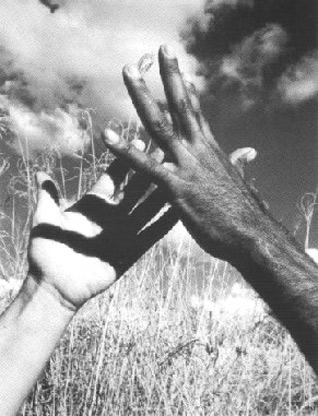Columnists
Soul Mates:
Letter & Spirit - # 7
YUKTANAND SINGH
The purpose of our life is to live it, and celebrate it, to its fullest.
Last week we read that we are allotted a fixed time for this. Not even a single extra breath is allowed at that preordained moment of death.
How can we assure that we have lived to our fullest?
We are good at celebrating death, with ceremonies and prayers for the loved ones. We feed the hungry in their memory. But we often forget to celebrate our loved ones when they are living, by thanking them, forgiving them, or by spending quality time with them.
We know this in our heart but we postpone doing it until a more suitable moment, but how do we know if we will have that moment? Death, as we know it, is unpredictable.
Are we living our life fully, now? More appropriately, do we know how to do so?
* * * * *
Some people take the sour grapes approach and call the world false. That is escapism. But it is also true that all the wealth and all the sensory pleasures do not lead to true fulfillment. Without spiritual awareness, every second of life in this world gets us closer to our death.
Gurbani says that a king and a pauper, both, are equally unhappy in darkness [GGS:325.1-4]. The light of naam shows us the true delight in everything we do by providing the necessary balance. Bringing spiritual light into our own life brings health to the entire society [GGS:694.16].
It is common knowledge among doctors that poor blood-supply or lack of oxygen - for example sleep apnea - can cause inability to focus, somnolence, fatigue, even loss of libido. When we live spiritually suffocated, we are similarly unable to fully enjoy our life.
Similarly, spirituality without the world as its sounding board is also simply hollow.
Gurbani teaches us to have balance, to celebrate various worldly relationships - mother, father, brother, child, spouse, friends, etc. - in the light of naam, by understanding their real purpose.
The contrast in various relationships in the world teaches us the value of true love. When we have developed a proper mindset and inner poise, then we do not have to renounce the world. We can continue our spiritual growth while living with all the pleasures [GGS:522.10].
* * * * *
We have not truly lived until we have tasted love and the pangs of separation. For this reason, the most cited relationship in gurbani is love between husband and wife.
Gurbani employs the model of marriage from that era, a time when the husband was the head of the household, and the wife was in a supporting role, with less or no rights, sometimes even treated as a mere chattel. That model also includes the master-servant relationship and thus it serves two purposes in gurbani. But this week we will discuss only the marital love.
In the modern ideal, the husband and wife are equal partners, and hopefully, there is no master or slave in a marriage today. But they cannot be equal in every aspect of life. The biological differences force each partner to dominate the other in some ways. Thus, the master-slave example still often comes into play in many households, even though the tables are turned several times in a day.
In the old days, serious courtship started after marriage but today we can easily spot who is courting and which couple is now married! As we know, true courtship and love needs to start in the kitchen. For the sake of gender equality we may rephrase the saying that the way to a woman's heart is through her stomach.
But this is not what we meant. Expecting love in return for something we gave, is keeping an account. That would be a transaction. Love is not a transaction. Expecting something in return from our lover is not true love.
True love is not something that we do by appointment, at a certain hour or on a certain day. Love calls for a constant interaction and it is not consummated if the spouse is engrossed with other things or with other people when the couple is together.
Thus, love starts in the kitchen by sharing the chores, working together and truly sharing the time together, with constant attention towards each other. If we spend the waking time that we have together by ignoring each other, then our spouse will invariably "have a headache" at night!
Thus, a marital couple lives also with a regular dose of healthy fear, fear of doing something that may spoil the spouse's mood and thus the night may go to waste.
Gurbani says that we must adorn ourselves and dress up for our lover, but only if the above conditions are met and our spouse wants us. Otherwise our spouse is not pleased.
The best ornaments are those that please our spouse, not the ones that please us.
To God, the ornaments we need would be the disciplines to prepare us for Him.
Gurbani takes for granted that Waheguru is here with us, but we may not see it that way.
Finally, when we are in love, we spontaneously call out the name of our lover. Guru Nanak asks in Japji for 'ikdoo jeebhou lakh ho-he' meaning, 'if I had a hundred thousand tongues and more ...' In other words, when we are in love, there is no count how many times we must call out His name.
This path leads to spiritual honor from Waheguru and union with Him.
* * * * *
Here is the first half of the shabad we have discussed above, on marital love: sabhay kant mahaylee-aa saglee-aa kar-eh seegaar' [GGS: 53.19] -
All are brides of the Husband Lord; they all decorate themselves.
But if they came to keep count, their red robe becomes a disorder.
Love is not obtained through hypocrisy. Corrupt intentions bring only misery. ||1||
My dear Lord, here is how a husband ravishes and enjoys his bride.
When a soul-bride is pleasing to you, Lord; by your grace, you adorn her. ||1||Pause||
Guru's word adorns her; her mind and body are then presented to her Husband Lord.
With her palms together, she stands alert and prays with her heart immersed in truth.
Colored with deep love, she dwells in true fear. Imbued with His love, she is then properly dyed. ||2||
The maid who surrenders to His name is called the handmaiden of her beloved Lord.
True love is never extinguished; she is united in union with the True One.
I am forever a sacrifice to that bride whose heart is soaked, pierced with the shabad. ||3||
The bride who is absorbed into the true Guru, shall never become a widow.
Her husband Lord is colorful and forever new. The True One never dies nor goes away.
In His will and truly in His grace, the happy soul-bride enjoys her union every day. ||4||
August 22, 2012
Conversation about this article
1: Gurnam Singh Gill (Michigan, USA.), August 27, 2012, 7:59 AM.
Yuktanand ji,I have a little issue with your interpretation regarding the fixed number of breaths allotted to each being. Could it be simply a way of reminding us of our certain mortality? Otherwise, how do you account for the vast increase in the average human life span during the past hundred years or so? There is also the distinct possibility that as we understand the aging processes better, we may be able to increase the lifespan even further.
2: Yuktanand Singh (USA), August 27, 2012, 6:40 PM.
Gurnam Singh ji, thanks for your response. I agree with you that the 'number of breaths' was a way of reminding us the certainty of our death. It was also to remind us that the time of death cannot be postponed. If we are supposed to live longer, after a cardiac arrest for example, then obviously we would be born today when the methods to keep us alive are available, in an era that is appropriate for the number of breaths allotted to us. I fail to see why our longer lifespan today would create a problem for God.
3: Yuktanand Singh (USA), August 27, 2012, 6:41 PM.
Let us examine another adage that is similar to the 'number of breaths'. Gurbani says that we are destined to eat only the grains that were already meant for us to eat [GGS:653.12]. Suppose we made soup from a sack of lentils. How is it possible to eat only certain grains then? We do not know. But the Guru knows. So far, even though we argue about the 'rationality' of an interpretation, we are unable to prove it wrong. Unless we could prove it wrong I prefer to interpret the Guru's words as they are.
4: Yuktanand Singh (USA), August 27, 2012, 6:43 PM.
Advances in science create a sense of control but they do not change nature. Each new discovery has made us feel that the old religious teachings are now outdated. But we are wiser now and we are rediscovering the old truths in their original light. The debate over predetermination is never ending. This is partly due to the fact that, appearance of destiny changes with the point of its observation. But destiny itself does not change, certainly not with a change in our lifespan!
5: Yuktanand Singh (USA), August 27, 2012, 6:45 PM.
Let us suppose a man suffers from cardiac arrest. Do we know how many more breaths were left in his destiny? We don't. If the resuscitation fails but he is destined to have more breaths, then I guess he would be placed on a ventilator. Conversely, if no more breaths were left in his destiny then a ventilator will not be available for some reason or another. This appears quite simple to me. Advances in technology do not change our destiny.
6: Yuktanand Singh (USA), August 27, 2012, 6:49 PM.
I prefer the original meaning because it is amply supported by other verses in gurbani. One such verse 'laykhai laidaa saahaa' [GGS:402.4] was cited last week. The problem is that meaningless repetition has turned the age-old truths from gurbani into cliches. We then naturally redefine these cliches in the light of our education, into something that would make sense to us today. Instead, we should be analyzing why the old and original meaning bothers us. This could lift us from our level to the Guru's thinking.
7: Yuktanand Singh (USA), August 28, 2012, 3:22 PM.
It appears that we are not comfortable with verses that stress the role of destiny. Instead of trying to shift their meaning, we should try to analyze why gurbani did this. Was this fatalism, or is there another reason?




